|
|
|
::::::::::::::::::::::::::::::::::::::::::::::::::::::::::::::::::::::::::::::::::::::::::::::::::::::::::::::::::::::::::
|
|
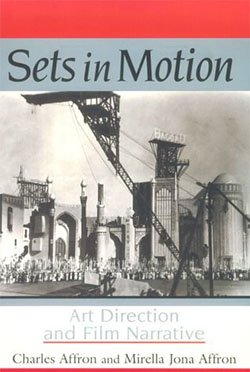 |
|
Sets in Motion : Art Direction and
Film Narrative |
|
作者:Charles
Affron Mirella Jona Affron
|
|
New Brunswick: Rutgers University
Press
ISBN: 0-8135-2161-0
252页
1995年7月第一版 |
|
|
<
INDEX |
|
The divided nature of the art director is reflected in Leon Barsacq's
survey of the differing titles assigned to the set designer across
national boundaries. In France, in general, it is "architect-decorator;"
in Germany, "architect"; in the Soviet Union, "painter-artist;" in
Britain, in imitation of the United States, it is "art director."
Souriau identifies three general
functions of decor that affect the reading of the set: the decorative
function, the localizing function, and the symbolic function. In
fulfilling its decorative function, film decor furnishes pleasing, even
beautiful images, providing a spectacle replete with plastic values;
through its localizing function, decor furnishes information to the
spectator about the events of the film and where and when they take
place; the power of decor's symbolic function permits it to express what
either cannot be said or is best left unsaid, thereby investing the film
with ideas and feelings, with signification.
Almost immediately La Kermesse
héroïque became one of the canonical texts of set design, its decors
among the few to attract critical attention. In Barsacq's copious
allusions to the work of Meerson, he makes several points that have
become commonplace in discussions of this film: (1) Meerson achieves a
synthesis of the Flemish town on the restricted space of a studio sound
stage; (2) thanks to the ingenious positioning of the camera, the angles
of the shots are both interesting and varied; (3) the scaled height of
the architectural elements of the model enhances the sense of
perspective; and (4) the size of the houses is reduced with respect to
life scale to facilitate framing. |
目 录
Contents
List of Illustrations
Acknowledgments
Introduction I
Chapter 1 Systems and Praxis
Chapter 2 Set Theory and Set as Denotation
Chapter 3 Set as Punctuation
Chapter 4 Set as Embellishment
Chapter 5 Set as Artifice
Chapter 6 Set as Narrative
Chapter 7 Judgment and Prize
Appendix A Staffing Charts of Three Major Art Departments
Appendix B Histories of Set Design
Appendix C Carlo Enrico Rava and Italian Film Journals of the Fascist
Period
Appendix D The Art Direction Oscar and Awards in Other Countries
Appendix E A Canon for Art Direction
Notes
Selected Bibliography
Index of Names and Titles
Index of Production Designers, Art Directors, and Related Personnel
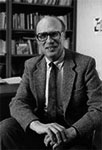
Charles Affron, 1935.10.16~
Professor Emeritus of New York
University.
|
|
本站简评
Brief comment
本书的论述风格与同类著作相比呈现了更多理性、严谨特征,比如在几个章节都提供了一些总结性文字,包括概念定义的探讨,附录中对主要参考资料做了简评,还包含少量统计表格,所以它有点像科学文献。作者除了详细描述电影布景和艺术设计之外,还讨论了电影公司和工作室的制作实务,包括人员配置和运作等等。但在大量列举实例过程中,作者并没有挖掘出深度联结,实乃这个浅表性、扁平化的话题本身所限,是可以理解的。
书中的百余幅插图具有较高质量,能够直观呈现文字描述的内容,其选择也比较有代表性,与本书性质吻合得很好。
不过这本书有一个缺点——仅针对我个人而言,它关注的是美国电影,以及好莱坞、奥斯卡,恰是我最不熟悉的,所以出现了大部分电影都没看过的情况。可以跟德勒兹等其他专业或业余理论家的著作对照,他们讲的那些电影经常是大多数我都看过。 |
|
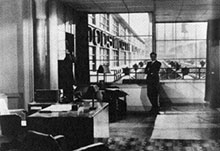
|
|
Dodswortfi:
Sam Dodsworth (Walter Huston) in his office |
|
|
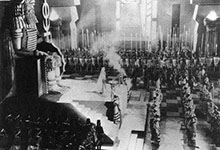
|
|
Noak's Ark:
the temple of Jaghuth |
|
|
 |
|
The Son of
Frankenstein: the dining room, Baron Frankenstein (Basil
Rathbone), his son (Richard Nichols), and his wife
(Josephine Hutchinson) |
|
|
|
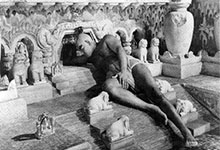
|
|
The Thief of
Bagdad (1940): the temple of the idol with the all-seeing
eye, the genie (Rex Ingram) |
|
|
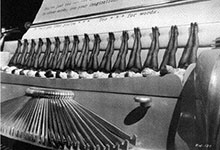
|
|
Ready,
Willing and Able: the giant typewriter, the "Too Marvellous
for Words" number |
|
|

|
|
Le Iour se
lève: François's room, the death of François (Jean Gabin) |
|
|
|
|
|
|
|
|
|
|
|
|
|
|
|
|
|
<
INDEX |
|